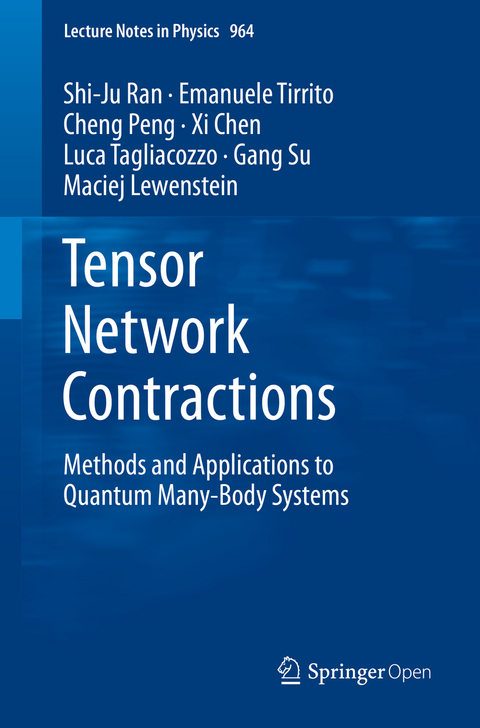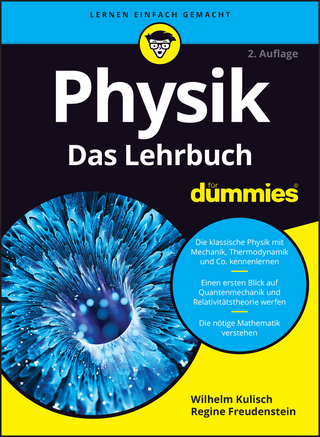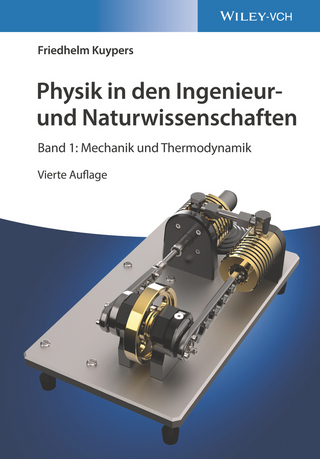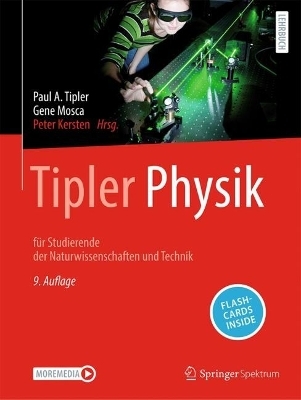
Tensor Network Contractions
Springer International Publishing (Verlag)
978-3-030-34488-7 (ISBN)
Tensor network is a fundamental mathematical tool with a huge range of applications in physics, such as condensed matter physics, statistic physics, high energy physics, and quantum information sciences. This open access book aims to explain the tensor network contraction approaches in a systematic way, from the basic definitions to the important applications. This book is also useful to those who apply tensor networks in areas beyond physics, such as machine learning and the big-data analysis.
Tensor network originates from the numerical renormalization group approach proposed by K. G. Wilson in 1975. Through a rapid development in the last two decades, tensor network has become a powerful numerical tool that can efficiently simulate a wide range of scientific problems, with particular success in quantum many-body physics. Varieties of tensor network algorithms have been proposed for different problems. However, the connections among different algorithms are notwell discussed or reviewed. To fill this gap, this book explains the fundamental concepts and basic ideas that connect and/or unify different strategies of the tensor network contraction algorithms. In addition, some of the recent progresses in dealing with tensor decomposition techniques and quantum simulations are also represented in this book to help the readers to better understand tensor network.
This open access book is intended for graduated students, but can also be used as a professional book for researchers in the related fields. To understand most of the contents in the book, only basic knowledge of quantum mechanics and linear algebra is required. In order to fully understand some advanced parts, the reader will need to be familiar with notion of condensed matter physics and quantum information, that however are not necessary to understand the main parts of the book. This book is a good source for non-specialists on quantum physics to understand tensor network algorithms and the related mathematics.
Shi-Ju Ran is an associate professor in the department of physics at Capital Normal University (CNU), Beijing, China. He obtained his bachelor's degree in the department of physics at Beijing Normal University, and his Ph.D. in the school of physics at University of Chinese Academy of Sciences. During 2015-2018, he worked as post-doctoral fellow at ICFO - the Institute of Photonic Sciences in Barcelona, Spain. His research interests include quantum many-body physics, tensor network algorithms, multi-linear algebra (tensor decompositions), and quantum machine learning. He is particularly enthusiastic about the highly inter-disciplinary researches, such as those between artificial intelligence and quantum physics. Emanuele Tirrito obtained his Master's degree in theoretical physics in 2014 at Pisa University. In 2015 he joined the Institute of Photonic Sciences in Castelledefels as a PhD student under Prof. Maciej Lewenstein's supervision. In 2018 he was a visiting student at Johannes Gutenberg Universität in Mainz. His main research interests include quantum many-body physics, tensor network algorithms, topological insulators and quantum machine learning. Cheng Peng is a postdoc scholar at the Stanford Institute for Materials and Energy Sciences (SIMES). Her research focuses on strongly correlated systems through numeric methods. She was a visiting student at ICFO in 2016. She obtained her Doctor degree of theoretical physics at University of Chinese Academy of Sciences in the year of 2018. She has been working mostly on applying matrix product state / matrix product operator (MPS/MPO) based density matrix renormalization group and tensor network algorithms to study a variety of spin and fermionic systems. Xi Chen obtained his PhD in theoretical physics in 2019. He has been working mostly on frustrated spin system, quantum spin liquid and topological ordered states by utilizing tensor network methods. He has published several peer-reviewed articles in international journals. Luca Tagliacozzo is a Lecturer in Physics and Chancellor's fellow at the University of Strathclyde since 2015. He is currently on leave to the Universitat de Barcelona as a Ramon y Cajal fellow. He obtained is Master degree at Università degli studi di Torino in 2000 and two PhD in high-energy physics in 2006 from the Politecnico di Torino and the Universitat de Barcelona. He was a post-doctoral fellow at the Universitat de Barcelona (2006-2007), the University of Queensland (2008-2010) and a Marie Curie Fellow at ICFO (2010-2015). His research focuses on the quantum many-body problem in and out of equilibrium using tensor networks and quantum simulations. He also actively works on the connections of these approaches to statistical mechanics and high-energy physics. Gang Su is Distinguished Professor and Vice-President at University of Chinese Academy of Sciences (UCAS), where he has taught and worked on condensed matter theory, statistical physics and computational physics for more than twenty-five years. He has obtained his bachelor's degree of Science and Ph.D. in theoretical physics at Lanzhou University, China. In 1993-99, he worked as a CEEC research fellow at the State University of New York at Stony Brook, USA, an Alexander von Humboldt research fellow at Köln University, Germany, and a JSPS research fellow at Tokyo University of Science, Japan. He has published more than 240 papers. His research projects have been funded by the Ministry of Science and Technology (MOST), the National N
Introduction.- Tensor Network: Basic Definitions and Properties.- Two-Dimensional Tensor Networks and Contraction Algorithms.- Tensor Network Approaches for Higher-Dimensional Quantum Lattice Models.- Tensor Network Contraction and Multi-Linear Algebra.- Quantum Entanglement Simulation Inspired by Tensor Network.- Summary.
"This book is particularly suitable for students and researchers who are new in this field. It is a timely book that provides a concise introduction of the important topics in this brand-new field with promising prospects. Furthermore, the book provides an up-to-date brief review, which is well suited as a reference for experience researchers." (Hong-Hao Tu, zbMATH 1442.81003, 2020)
| Erscheinungsdatum | 30.01.2020 |
|---|---|
| Reihe/Serie | Lecture Notes in Physics |
| Zusatzinfo | XIV, 150 p. 68 illus., 65 illus. in color. |
| Verlagsort | Cham |
| Sprache | englisch |
| Maße | 155 x 235 mm |
| Gewicht | 260 g |
| Themenwelt | Naturwissenschaften ► Physik / Astronomie ► Allgemeines / Lexika |
| Naturwissenschaften ► Physik / Astronomie ► Theoretische Physik | |
| Schlagworte | multi-linear algebra • Open Access Book • quantum circuits • quantum entanglement • quantum simulations in many-body systems • Renormalization Group • Strongly-correlated systems • Tensor decompositions |
| ISBN-10 | 3-030-34488-6 / 3030344886 |
| ISBN-13 | 978-3-030-34488-7 / 9783030344887 |
| Zustand | Neuware |
| Haben Sie eine Frage zum Produkt? |
aus dem Bereich


